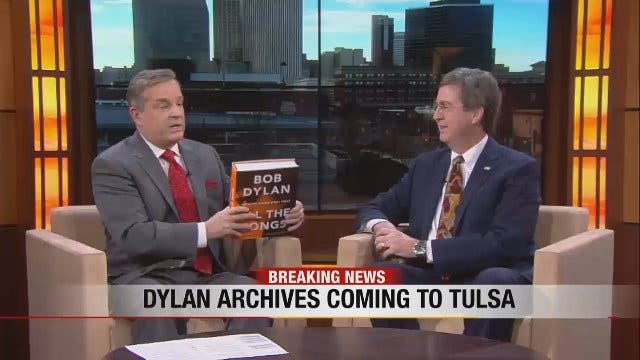Bob Dylan's Archives Coming To Tulsa
<p>The Bob Dylan Archive has been acquired by the George Kaiser Family Foundation and The University of Tulsa and will be permanently housed in Tulsa.</p>Wednesday, March 2nd 2016, 7:47 am
The Bob Dylan Archive has been acquired by the George Kaiser Family Foundation and The University of Tulsa and will be permanently housed in Tulsa.
According to a news release, the Bob Dylan Archive will be under the stewardship of TU’s Helmerich Center for American Research, for subsequent public exhibition in the city’s Brady Arts District.
Comprised of more than 6,000 items spanning nearly 60 years of Bob Dylan’s career, the archive includes decades of never-before-seen handwritten manuscripts, notebooks and correspondence; films, videos, photographs and artwork; memorabilia and ephemera; personal documents and effects; unreleased studio and concert recordings; musical instruments and many other items.
“The University of Tulsa is pleased to collaborate with the George Kaiser Family Foundation in assuming the role of steward for this invaluable collection. Because of the level of scholarship available through the university and its partners, TU is the perfect keeper of The Bob Dylan Archive,” said TU President Steadman Upham.
“Dylanology is a growing aspect of social science and humanities research, and Tulsa will soon become the international epicenter for the academic pursuit of all things Dylan.”
Tulsa Mayor Dewey Bartlett says this is great news for Tulsa.
"This is a thrilling and tremendously exciting opportunity for Tulsa," said Dewey Bartlett.
"Bob Dylan represents a musical heritage that ties together not just Dylan's contributions, but the likes of Tulsa's JJ Cale, Leon Russell, and Ronnie Dunn. They each have had tremendous influence upon notables such as Eric Clapton who for decades, exclusively had the Tulsa Sound Musicians employed for his tours and recordings. Tulsa's musical roots are truly deep and fertile. Dylan has even influenced American literature and film. There is no denying, this will certainly enrich the lives of our citizens for generations to come."
“I’m glad that my archives, which have been collected all these years, have finally found a home and are to be included with the works of Woody Guthrie and especially alongside all the valuable artifacts from the Native American Nations. To me, it makes a lot of sense and it’s a great honor,” said Bob Dylan.
Nearly 1,000 items from The Bob Dylan Archive have already been brought to the Hardesty Archival Center inside the Helmerich Center for American Research, which is affiliated with Tulsa’s Gilcrease Museum.
Officials say the process of physically acquiring the complete archive will span two years, as the individual components are gathered from their numerous locations, inventoried and carefully shipped to Tulsa.
The Kaiser Foundation says a permanent exhibit space for The Archive will be designated near the Woody Guthrie Center in Tulsa’s Brady Arts District, which houses a museum dedicated to American folksinger and Oklahoma native Woody Guthrie.
The release goes on to say Guthrie was one of Dylan’s most significant early influences, even inspiring one of Dylan’s first tracks, “Song to Woody” on his 1962 self-titled album.
"We are beyond thrilled that these treasures have found a home in Tulsa. It makes sense to both of us and Dylan that these artifacts live at the Gilcrease Museum in Tulsa, where music enthusiasts can view the artifacts, as the history is truly understood here. This gift by the George Kaiser Family Foundation and University of Tulsa is astronomical in continuing to validate Tulsa as a music and culture hub. We are forever grateful for everything GKFF does to improve Tulsa for our visitors, in addition to making our region a wonderful place to live," said Mike Neal, President and CEO of the Tulsa Regional Chamber.
The Bob Dylan Archive is a comprehensive anthology that encompasses thousands of historic items that exemplify the evolution of masterpieces that today are woven into the annals of American music, such as:
- A notebook from 1974 containing Dylan’s handwritten lyrics to songs that were eventually recorded for the artist’s biggest-selling album, Blood On The Tracks, including “Tangled Up In Blue,” “Simple Twist Of Fate” and “Idiot Wind.”
- Sketches, writings and edits from Tarantula, Dylan’s 1965 groundbreaking collection of experimental poetry.
- Dylan lyrics and chord progressions for unrecorded songs, circa 1970.
- Handwritten notes from Dylan and director Howard Alk, detailing editing notes and shot selects from the films Eat The Document (1971) and Renaldo And Clara (1978).
- Dylan’s 1962 signed contract with Witmark Music, his first music publisher.
- Dylan’s 1966 wallet containing numerous inserts, including paper with Johnny Cash’s address and phone number, as well as a business card from Otis Redding.
- Complete, never-released Dylan concert films from Toronto’s Massey Hall in 1980 and New York’s Supper Club from 1993.
- Dylan’s earliest music recordings from 1959.
- The leather jacket worn by Dylan onstage at The Newport Folk Festival in 1965, the year he “went electric.”
- The surviving harp from inside the piano on which Dylan composed “Like A Rolling Stone.”
- Lyrics to “Chimes Of Freedom,” handwritten by Dylan in 1964 on hotel stationary, complete with annotations and additional verses.
- In-progress and final lyrics to all songs from Dylan’s latter-day masterpiece, Time Out Of Mind, handwritten and annotated by the artist.
More Like This
March 2nd, 2016
September 29th, 2024
September 17th, 2024
Top Headlines
January 2nd, 2025
January 2nd, 2025
January 2nd, 2025
January 2nd, 2025










